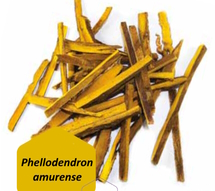How Dopamine Protects the Aging Brain
 Dopamine is a neurotransmitter that promotes feelings of pleasure and reward, supports memory, attention, and more.1
Dopamine is a neurotransmitter that promotes feelings of pleasure and reward, supports memory, attention, and more.1
As we age, increased activity of an enzyme called monoamine oxidase B (MAO-B) degrades dopamine, causing levels to fall.2
Lower dopamine levels can contribute to reduced motivation and decreased enthusiasm for things that would excite most people.
A solution is to ingest compounds that inhibit the MAO-B enzyme.
Scientists have found that components of phellodendron tree bark accomplish this in lab studies3,4 and have neuroprotective effects in animals.5-7
Preclinical research also shows that a specific form of vitamin B12 may protect neurons and help prevent a decline in dopamine levels.8
These compounds may help maintain motivation and feelings of pleasure, while reducing risk for neurodegenerative illnesses.
What is Dopamine?
 Dopamine is often referred to as the “feel-good hormone” due to its role in regulating mood.1
Dopamine is often referred to as the “feel-good hormone” due to its role in regulating mood.1
The brain releases dopamine during pleasurable activities. Low dopamine levels are associated with depression and a lack of motivation and pleasure.9
But the brain uses dopamine for more than mood elevation.
This neurotransmitter also influences movement, learning, cognition, and memory.10
Dopamine enables youthful cognitive performance and body coordination.11,12
Dopamine depletion plays a role in certain neuro-degenerative diseases, while increasing dopamine has been shown to prolong lifespan in animals.1,13,14
Dangers of Reduced Dopamine
In a region of the brain that plays a role in cognitive and motor function, levels of dopamine decline by about 13% each decade after age 45.15
This decline coincides with an increase in the brain levels of monoamine oxidase B (MAO-B), an enzyme that degrades neurotransmitters such as dopamine.2
Low dopamine levels are associated with depression, lack of motivation, and pleasure.9 These mood and motivational changes also may be seen with normal aging in some people.
Rising MAO-B levels pose even more of a threat.
MAO-B activity is higher in dementia patients than in non-impaired individuals the same age,16 suggesting a role in neurodegeneration.
One reason may be that increased MAO-B activity results in formation of potentially damaging by-products2,17,18 that can contribute to neurodegenerative diseases such as Parkinson’s and Alzheimer’s disease.
Doctors frequently prescribe MAO-B inhibitors such as deprenyl (also called selegiline) to stop MAO-B degradation of dopamine in patients with Parkinson’s disease.19
Inhibiting MAO-B activity helps decrease the breakdown of dopamine and the potential harm that can be done by too much enzyme activity. This helps protect our aging brains.
The Effects of Phellodendron
 Scientists discovered that some plants have MAO-B-inhibiting properties.
Scientists discovered that some plants have MAO-B-inhibiting properties.
After investigating hundreds of botanicals, they identified phellodendron tree bark as one of the most potent plant-derived MAO-B inhibitors.3,4
Phellodendron (no relation to the houseplant philodendron) is also known as Amur cork tree. It has been safely used in traditional Chinese medicine for centuries to treat various ailments.5
In lab research, extract of phellodendron bark selectively inhibited over 80% of MAO-B activity, which is comparable to the drug deprenyl.4
This may enable dopamine levels to increase while blocking the neurotoxic effects of elevated MAO-B.
Phellodendron’s neuroprotective properties go beyond MAO-B inhibition. 5,6,20
In scientific studies, phellodendron protects against neuroinflammation, beta-amyloid production, and other changes associated with Alzheimer’s disease, suggesting it may help to maintain cognitive function into older age.20
Phellodendron has also demonstrated anti-inflammatory, antibacterial, antiviral, and antitumor properties,5 helping to protect both the brain and body.
Those who take MAO-B-inhibiting drugs such as deprenyl do not need to take phellodendron. Phellodendron is not a substitute for physician-prescribed medications.
A B12 Form Helps Sustain Dopamine Levels
 There are two bioactive forms of vitamin B12. 21 One of them, adenosylcobalamin, has been shown in lab research to prevent a decline in dopamine levels and protect neurons.8
There are two bioactive forms of vitamin B12. 21 One of them, adenosylcobalamin, has been shown in lab research to prevent a decline in dopamine levels and protect neurons.8
In research partially funded by the Michael J. Fox Foundation, scientists prepared brain slices of mice that carried a mutation linked to Parkinson’s disease and treated some with adenosylcobalamin.8 Every two minutes, they stimulated the dopamine-producing neurons.
After 20 minutes, the untreated control slices were releasing approximately 20% less dopamine. In the mice, dopamine production dropped by up to 45%.
In the adenosylcobalamin-treated slices, dopamine production was equal to that of animals without the mutation linked to Parkinson’s disease.8
Stated differently, instead of dopamine production declining by 45% after 20 minutes like in the untreated brain slices, in the treated slices, it only dropped by 20% in response to the artificial stimulation.
This suggests that adenosylcobalamin may help prevent dopamine loss and related neurotoxicity.
Taken together, phellodendron extract and adenosylcobalamin may prevent an age-related decline in critical dopamine levels.
Summary
 Levels of the neurotransmitter dopamine decline in the aging brain, in part due to increased activity of the enzyme MAO-B.
Levels of the neurotransmitter dopamine decline in the aging brain, in part due to increased activity of the enzyme MAO-B.
The result can be decreased motivation, diminished pleasure, and an increased risk for neurodegenerative diseases.
Scientists have found that phellodendron bark extract inhibits MAO-B, helping to maintain dopamine levels and prevent neurotoxicity.
A form of vitamin B12 called adenosylcobalamin may also prevent a decline in dopamine levels and help inhibit neurodegeneration.
These compounds may prevent declines in pleasure and motivation and protect the aging brain.
 Increases in the enzyme monoamine oxidase B (MAO-B) contribute to lower levels of the neurotransmitter dopamine after middle age. This can lead to reduced motivation and pleasure.
Increases in the enzyme monoamine oxidase B (MAO-B) contribute to lower levels of the neurotransmitter dopamine after middle age. This can lead to reduced motivation and pleasure.- Heightened MAO-B activity is also linked to altered brain function and certain neurodegenerative diseases.
- After screening hundreds of plants, scientists identified phellodendron bark extract as one of the most powerful inhibitors of MAO-B.
- A form of vitamin B12 called adenosylcobalamin has also been shown to help prevent a decline in dopamine levels and to inhibit neurodegeneration in preclinical studies.
- These compounds may help maintain positive mood and motivation while inhibiting neurodegeneration.
Inhibiting MAO-B May Boost Lifespan
 The drug deprenyl is prescribed to inhibit MAO-B activity, most often in Parkinson’s disease patients.19 Inhibiting MAO-B leaves more dopamine in the brain’s neural circuits.
The drug deprenyl is prescribed to inhibit MAO-B activity, most often in Parkinson’s disease patients.19 Inhibiting MAO-B leaves more dopamine in the brain’s neural circuits.
In dogs, deprenyl treatment helped improve cognitive function.22
Additionally, animal studies have also found that MAO-B inhibition extends lifespan.23-29
For example, rats given deprenyl had an average lifespan up to 40% longer than untreated rats.27,28
Material used with permission of Life Extension. All rights reserved.


